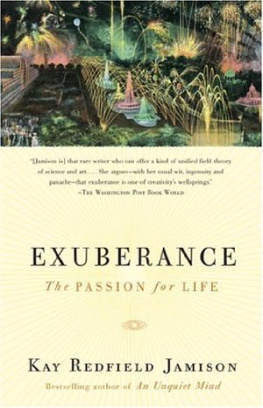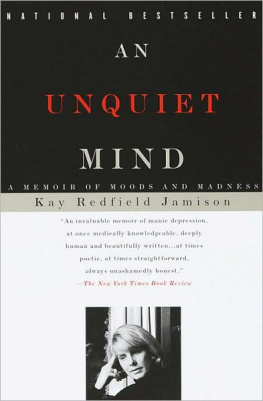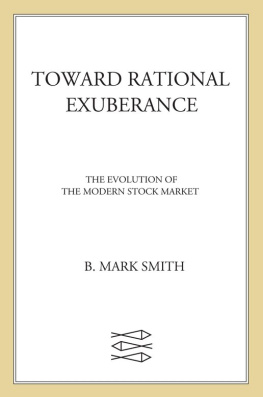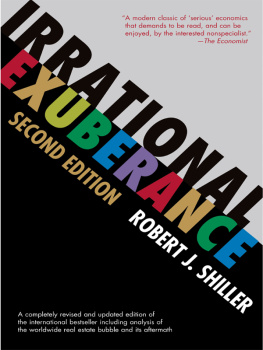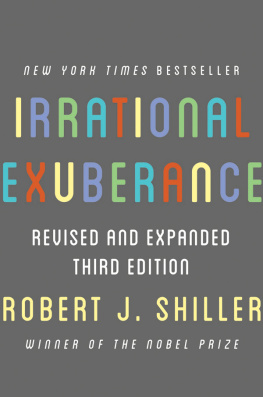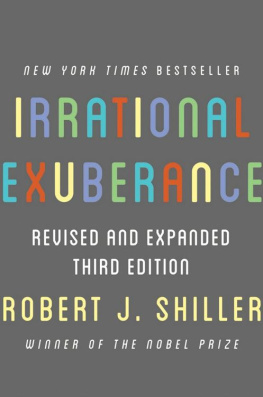ALSO BY KAY REDFIELD JAMISON
Night Falls Fast:
Understanding Suicide
An Unquiet Mind:
A Memoir of Moods and Madness
Touched with Fire:
Manic-Depressive Illness and the Artistic Temperament
TEXTBOOKS
Manic-Depressive Illness
(with Frederick Goodwin)
Abnormal Psychology
(with Michael Goldstein and Bruce Baker)
THIS IS A BORZOI BOOK
PUBLISHED BY ALFRED A. KNOPF
Copyright 2004 by Kay Redfield Jamison
All rights reserved under International and Pan-American Copyright Conventions. Published in the United States by Alfred A. Knopf, a division of Random House, Inc., New York, and simultaneously in Canada by Random House of Canada Limited, Toronto. Distributed by Random House, Inc., New York.
www.aaknopf.com
Owing to limitations of space, all acknowledgments for permission to reprint previously published material may be found preceding the index.
Knopf, Borzoi Books, and the colophon are registered trademarks of Random House, Inc.
Library of Congress Cataloging-in-Publication Data
Jamison, Kay R.
Exuberance / by Kay Redfield Jamison.
p. cm.
eISBN: 978-1-4000-4374-3
1. Joy. 2. Enthusiasm. I. Title.
BF 575. H 27 J 36 2004
152.42dc22
2004046561
v3.1
For my father,
Marshall Jamison, Ph.D.,
whose exuberance
has been deeply and wonderfully contagious
and
Daniel Auerbach, M.D.,
to whom I owe so much of my life and work
In Memoriam
Richard Wyatt, M.D.,
my husband, colleague, and closest friend
and
Dr. Harriet Braiker,
David Mahoney, Dr. Anthony Storr,
Judy Hoyer, Katharine Graham,
irreplaceable friends
Contents
CHAPTER ONE
Incapable of Being Indifferent

I t is a curious request to make of God. Shield your joyous ones, asks the Anglican prayer: Shield your joyous ones. God more usually is asked to watch over those who are ill or in despair, as indeed the rest of the prayer makes clear. Watch now those who weep this day, it goes. Rest your weary ones; soothe your suffering ones. The joyous tend to be left to their own devices, the exuberant even more so.
Perhaps this is just as well. Those inclined toward exuberance have enjoyed the benign neglect of my field. Psychologists, for reasons of clinical necessity or vagaries of temperament, have chosen to dissect and catalogue the morbid emotionsdepression, anger, anxietyand to leave largely unexamined the more vital, positive ones. Not unlike God, if only in this one regard, my colleagues and I have tended more to those in the darkness than to those in the light. We have given sorrow many words, but a passion for life few.
Yet it is the infectious energies of exuberance that proclaim and disperse much of what is marvelous in life. Exuberance carries us places we would not otherwise goacross the savannah, to the moon, into the imaginationand if we ourselves are not so exuberant we will, caught up in the contagious joy of those who are, be inclined collectively to go yonder. By its pleasures, exuberance lures us from our common places and quieter moods; andafter the victory, the harvest, the discovery of a new idea or an unfamiliar placeit gives ascendant reason to venture forth all over again. Delight is its own reward, adventure its own pleasure.
Exuberance is an abounding, ebullient, effervescent emotion. It is kinetic and unrestrained, joyful, irrepressible. It is not happiness, although they share a border. It is instead, at its core, a more restless, billowing state. Certainly it is no lulling sense of contentment: exuberance leaps, bubbles, and overflows, propels its energy through troop and tribe. It spreads upward and outward, like pollen toted by dancing bees, and in this carrying ideas are moved and actions taken. Yet exuberance and joy are fragile matter. Bubbles burst; a wince of disapproval can cut dead a whistle or abort a cartwheel. The exuberant move above the horizon, exposed and vulnerable.
Exuberance keeps occasional company with grief, though grief may command the greater mention. Blakes belief that Under every grief & pine/Runs a joy with silken twine is a received theme in folklore. Our greatest joys and sorrows ripen on the same vine, says the American proverb. Danger and delight grow on one stalk, maintains the English one. Intense emotions inhabit a correspondent territory: joy may be our wings and sorrow our spurs, but the boundaries between the moods are open. Wings and high moods are shivery things; the joyous do indeed need shielding.
Exuberance is a vital emotion; it demands not only defense but exposure, for despair far more than joy has found sympathy with poets and scholars. Joy lacks the gravitas that suffering so effortlessly commands. Joy without reflection is evanescent; without counterweight, it has no weight at all. Or so one would think.
Yet joy is essential to our existence. Exuberance, joys more energetic relation, occupies an ancient region of our mammalian selves, and one to which we owe in no small measure our survival and triumphs. It is a material part of our pursuitslove, games, hunting and war, explorationand it is a vibrant force to signal victory, proclaim a time to quicken, to draw together, to exult, to celebrate. Exuberance is ancient, material, and profound. The Greeks understood the mysterious power of the hidden side of things, wrote Louis Pasteur. They bequeathed to us one of the most beautiful words in our languagethe word enthusiasmen theosa god within. The grandeur of human actions is measured by the inspiration from which they spring. Happy is he who bears a god within, and who obeys it.
Like many essential human traits, exuberance is teeming in some and not to be caught sight of in others. For a few, exuberance is in the blood, an irrepressible life force. It may ebb and flow, but the underlying capacity for joy is as much a part of the person as having green eyes or a long waist. For them, as the psalm promises, a full joy cometh in the morning. Not so for most others. Exuberance is a more occasional thing, something to be experienced only at splendid moments of love or attainment, or known in youth but lost with time. The nonexuberant lack fizz and risibility: they need to be lifted up on the enthusiasm of others; roused by dance or drug; impelled by music. They do not kindle of their own accord.
Variation in temperament is necessary. Exuberance, indiscriminately apportioned, is anarchical. If all were effervescent, the world would be an exhausting and chaotic place, driven to incoherence by competing enthusiasms or becalmed by indifference to the day-to-day requirements of life. Our species, like most, is well served by a diversity of temperaments, a variety of energies and moods. Exuberance is a fermenting, pushing-upward-and-forward force, but sometimes fixity is critical to survival. The joyous, and the not so, need one another in order to survive.
I believe that exuberance is incomparably more important than we acknowledge. If, as it has been claimed, enthusiasm finds the opportunities and energy makes the most of them, a mood of mind that yokes the two is formidable indeed. Exuberant people take in the world and act upon it differently than those who are less lively and less energetically engaged. They hold their ideas with passion and delight, and they act upon them with dispatch. Their love of life and of adventure is palpable. Exuberance is a peculiarly pleasurable state, and in that pleasure is power.

